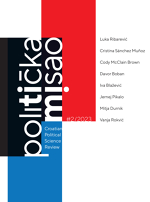The Concept of Awkward Powers in Foreign Relations: Comparative Analysis of Canada and the European Union
The Concept of Awkward Powers in Foreign Relations: Comparative Analysis of Canada and the European Union
Author(s): Jernej Pikalo, Mitja DurnikSubject(s): Diplomatic history, Political history, International relations/trade, Security and defense, Transformation Period (1990 - 2010), Present Times (2010 - today), EU-Accession / EU-DEvelopment
Published by: Fakultet političkih znanosti u Zagrebu
Keywords: Power; Awkward Power; Realism; Liberalism/Constructivism; EU; Canada;
Summary/Abstract: This paper addresses a specific phenomenon concerning power concepts in Canadian and EU foreign policies. As is widely known, the liberal-democratic platform has dominated global relations after the end of the Cold War. Implemented power approaches are studied from theoretical perspectives of liberalism/constructivism standpoints and their realist critique. Canada has been presented mostly as a middle power in international relations trying to find its specific role as a mediator and balancer among superpowers. On the other hand, the EU is classified predominantly as a normative power with tendencies to act as a great power from some point of view. In the paper, we analyse both entities through the recent concept of ‘awkward power’, whereby states have a so-called “dubious character”, acting in-between the potential of great and middle powers.
Journal: Politička Misao
- Issue Year: LX/2023
- Issue No: 02
- Page Range: 93-121
- Page Count: 29
- Language: English

